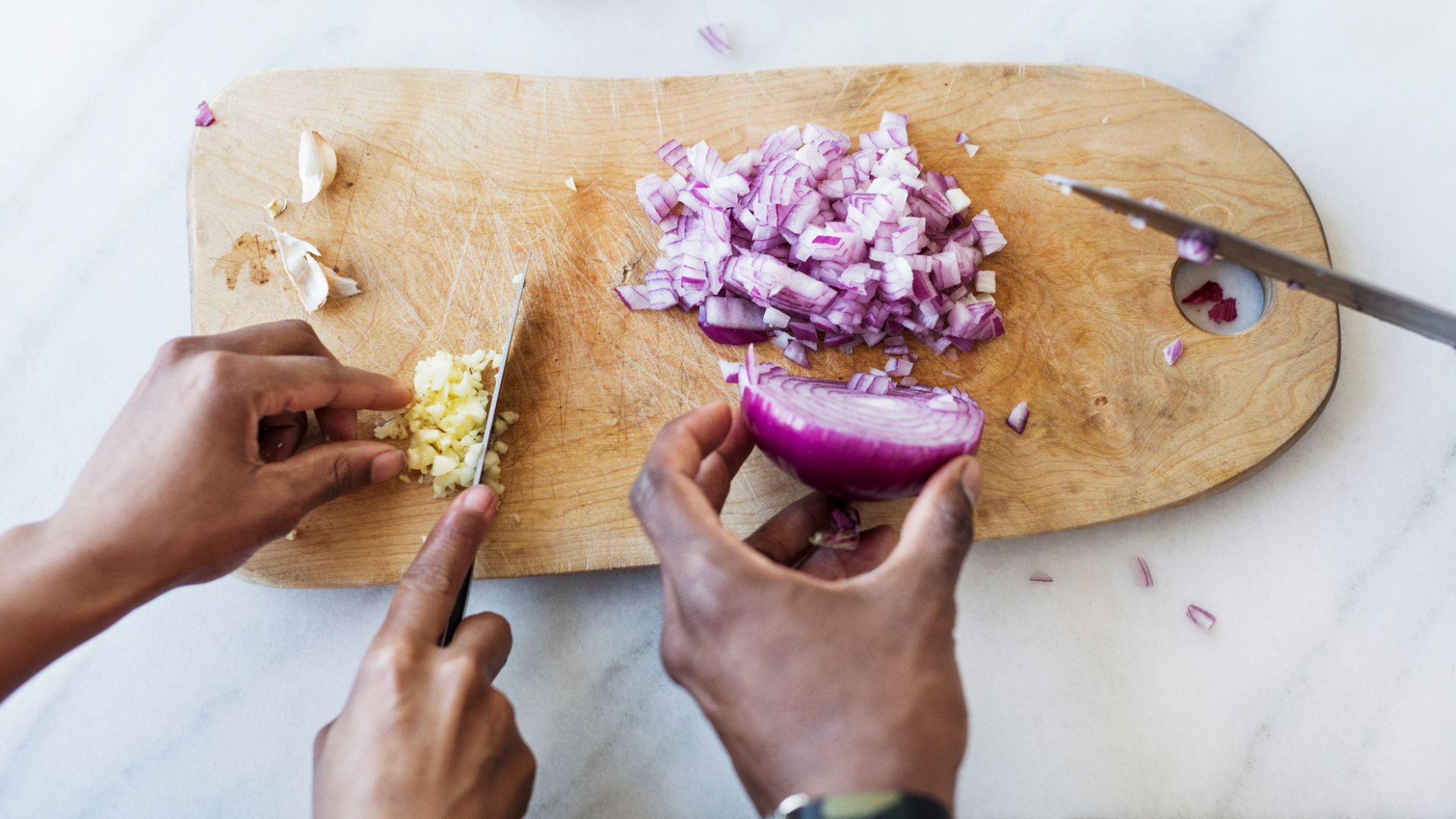What causes bloating? Experts reveal 8 common triggers and how to stop it quickly
Up to 75% of women experience bloating every month for various reasons. Here, the experts reveal what causes bloating - and what you can do about it


Painful at worst and always uncomfortable, bloating is one of the most disruptive digestive feelings we can experience. It's typically a feeling of fullness and pressure, and you may see your stomach swelling.
Bloating can have simple causes, from eating certain foods that cause bloating and stress to more complex ones involving hormones. For most, a build-up of air in the colon is the root of the issue, says Sophie Medlin, a consultant colorectal dietitian. "Your colon is 1.5m long and wraps around the left-hand side of your pelvis, up under your ribs and down to your right pelvis. You can imagine how uncomfortable this will be when it's filled with gas," she says.
Perhaps you don't have to imagine - according to research from the Cleveland Clinic, up to 75% of women experience bloating at least once a month. Here, we speak to the experts to reveal the most common triggers for this air build-up, the other causes of bloating to be aware of, and how to get rid of bloating quickly.
What causes bloating?
1. Swallowing too much air when eating
Feel bloated after eating? "The cause of bloating can be as simple as eating too quickly," says Medlin, also the head of nutritional research at Heights - gut health supplements designed to support the brain and the gut. "The first thing to cause digestive bloating is consuming too much air when you're eating because you're rushing, not eating mindfully, or you're drinking lots of fizzy drinks."
The tiny gulps of air you take when eating and the bubbles from the fizzy drinks can get trapped in the colon and cause an uncomfortable build-up of air.

Sophie Medlin is a consultant colorectal dietitian with over 17 years experience in the treatment and management of gut conditions. As well as her clinical work leading the team at CityDietitians she is the Head of Nutritional Research at Heights where she formulates probiotic and vitamin products. Heights is on a mission to bring top quality supplements to the brain health space due to the huge impact nutrition and gut health has on our mental health.
2. Stress
If you're experiencing the signs of high cortisol levels and bloating, your issue may be down to stress - mental or physical. "When our gut bacteria changes due to stress or restrictive diets, for example, the balance of species can shift," says Medlin. "This means you’re more prone to rapid fermentation in the colon, leading to excessive gas production and bloating."
Taking on a restrictive diet that removes certain food groups or limits calories can cause undue stress on the body, both mentally and physically. Research from the University of California found that monitoring your diet is associated with more psychological stress (calorie counting, watching what you eat at a restaurant, and so on) and restricting calorie intake was found to increase daily cortisol levels.
Sign up to our free daily email for the latest royal and entertainment news, interesting opinion, expert advice on styling and beauty trends, and no-nonsense guides to the health and wellness questions you want answered.
"Bloating can also be made worse when we feel anxious because our diaphragm is pushed down and this causes our stomach to push out," she adds.
3. Certain foods
Some bloat-inducing foods include onions, garlic, apples and pears, says Medlin. Eating these often or in larger quantities can cause a negative reaction in the digestive system. These fruits and vegetables contain fructans - soluble fibres that draw more water into the intestine.
"A sign that your bloating is linked to the foods you’re eating is that it builds up throughout the day. If this is the case, it’s a good idea to see a registered dietitian who can support you in finding your food triggers and guide you to dealing with the underlying microbiome disruption, without cutting foods out and making the problem worse in the long run," says Medlin.
However, it's not just the foods you should consider when looking at what causes bloating. "Many health supplements contain fermentable carbohydrates, such as inulin, GOS and FOS, which can add to the problem," says the dietitian. This does include some popular greens powders, so if you're thinking about trying these, be sure to check the label.

Onions and garlic are two common foods that can cause bloating.
4. Sugary foods
The small intestines don't have the enzymes needed to break down many (especially artificial) sugars and sweeteners in food. When this undigested food moves to the large intestine, bacteria can help break it down. However, this process causes gasses like carbon dioxide to form, which can cause bloating.
Sugary foods can also disrupt how some of our digestive hormones are produced. Motilin is a hormone released when we haven't eaten in a while. As a report by VA Medical Centre explains, it's a hormone that stimulates the small intestine, helping to move undigested food into the larger intestine, which would otherwise sit in the smaller intestine and cause discomfort.
When we eat foods rich in sugar and fat, we produce less motilin, which can be what causes bloating. "Reduced motilin levels can slow intestinal movements, causing food to linger in the stomach and intestines longer than usual, leading to gas buildup and bloating," says Kocsis.
5. Phases in the menstrual cycle
Bloating is a common symptom in certain phases of the menstrual cycle - especially during perimenopause. During perimenopause, identified by a change in your periods, hormones in the body are changing quickly and in flux. This can lead to higher levels of oestrogen at certain points, a hormone that causes the body to retain water, which leads to bloating.
While hormone replacement therapy (HRT) can help with the problem, it can also be the cause for some people. So, if you are currently menopausal and taking HRT, this could also be the cause of the bloating.
For those with a regular menstrual cycle, this is also an issue as oestrogen levels naturally elevate just before a period, which causes the same type of bloating.
6. Constipation
Temporary or frequent constipation is another common cause of bloating and can cause discomfort and pain in the abdominal area, since the longer a stool stays in your colon before passing, the more time bacteria has to ferment. The fermenting of the bacteria in the colon causes gas build-up, which causes bloating.
Medlin says: "If I see a patient who isn't having their bowels open daily and is complaining of bloating, we always deal with the constipation first. This is likely to relieve the bloating."
7. Disruption to digestive hormones
Hormones are another key cause of bloating as many of our essential hormones are made in the digestive system. Several factors go into how the production of these hormones is triggered - like sleep, for example.
Not only does a lack of sleep cause physical stress on the body, elevating our cortisol levels and shifting the ratio of 'good' and 'bad' gut bacteria, but not getting a full night's sleep regularly enough impacts digestive hormones like ghrelin. This is the hunger hormone that signals to the brain that we need to eat. Sleep is one of the triggers for this hormone, per research by the University of Luebeck. When we don't get enough sleep, ghrelin levels tend to rise so we feel hungry when we're not.
If we eat when we're sleep-deprived, research by Pennington Biomedical Research Center shows we're more likely to opt for high-sugar and high-fat foods. And as noted, eating these can lower motilin levels in the body - another important digestive hormone.
"Various hormones produced in the digestive system, such as ghrelin, cholecystokinin (CCK), and motilin, also play a role in regulating hunger, satiety, and gastrointestinal motility," says Mike Kocsis, a hormone expert who works with Balance My Hormones, with over 20 years in the healthcare industry. "Imbalances in these hormones can affect we process food and how food moves through the digestive tract, which can be what causes bloating."
Mike Kocsis is an expert on hormones, with over 20 years in the healthcare sector and much of this time working with people who have hormone imbalances. He is also the medical case manager for Balance My Hormones.
8. Digestive disorders
Bloating is one of the common symptoms of irritable bowel syndrome (IBS). The condition is diagnosed when the body can't undergo digestive processes as normal - often for unexplained reasons.
IBS must always be diagnosed by a medical expert so be sure to visit your GP if you also have any of these symptoms, as well as bloating:
- Diarrhea
- Constipation
- Nausea
- Vomiting
- Fever
- Bleeding
- Anemia
- Unintentional or unexplained weight loss
How to stop bloating
- Peppermint: "Peppermint tea and capsules help relax the gut muscles, sometimes making bloating feel better," says Medlin.
- Charcoal supplements: "Some people feel that charcoal tablets help as they absorb gas, but these must not be used long term or frequently because they absorb nutrients and medications too," she says.
- Magnesium supplements: The benefits of magnesium know no end - along with being beneficial for sleep, magnesium has a laxative effect. If you're struggling with constipation-related bloating, it can be helpful.
- Yoga: "Gut-directed yoga, hypnotherapy, and breathwork are all helpful for bloating," says Medlin. This could be as simple as a yoga workout every few days or doing yoga every day to help settle the digestive system.
- Reduce stress: Identifying your stress triggers and working on how to lower cortisol levels is a good idea if you find yourself bloated regularly as it can be a vicious circle. "If we're stressed about bloating, the contraction of the diagram [which happens when you're stressed] can make it worse," she says.
- Go for a walk: If you're feeling bloated after eating, go for a walk. Several studies show that walking after eating can alleviate bloating as the movement stimulates the stomach and intestines, helping food to move through the digestive system.
- See a professional: "Longer term solutions to bloating include seeing a registered dietitian, who can help to find your food triggers," says Medlin. They may also recommend a good-quality probiotic.
When to worry about bloating
Bloating is a very normal condition, the experts say. However, if you are waking up feeling bloated and it doesn't go away after a trip to the bathroom, it's best to visit a doctor as it may be a sign of something more serious.
"This can be a sign of gynaecological cancers. Painful bloating associated with acute diarrhoea which alleviates the bloating can be a sign of scar tissue in the bowel known as adhesions, and your GP should take this seriously," says Medlin.

Grace Walsh is woman&home's Health Channel Editor, working across the areas of fitness, nutrition, sleep, mental health, relationships, and sex. She is also a qualified fitness instructor. In 2025, she will be taking on her third marathon in Brighton, completing her first ultra marathon, and qualifying as a certified personal trainer and nutrition coach.
A digital journalist with over seven years experience as a writer and editor for UK publications, Grace has covered (almost) everything in the world of health and wellbeing with bylines in Cosmopolitan, Red, The i Paper, GoodtoKnow, and more.